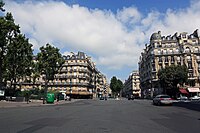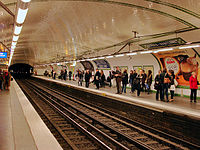Sèvres–Babylone (Paris Métro)
| Paris Métro station | ||||||||||||||||
 Line 10 platforms | ||||||||||||||||
| Location | 6th and 7th arrondissement of Paris Île-de-France France | |||||||||||||||
| Coordinates | 48°51′05″N 2°19′36″E / 48.85151°N 2.326655°ECoordinates: 48°51′05″N 2°19′36″E / 48.85151°N 2.326655°E | |||||||||||||||
| Owned by | RATP | |||||||||||||||
| Operated by | RATP | |||||||||||||||
| Other information | ||||||||||||||||
| Fare zone | 1 | |||||||||||||||
| History | ||||||||||||||||
| Opened | 5 November 1910 | |||||||||||||||
| Previous names | Sèvres–Croix-Rouge (1910–1923) | |||||||||||||||
| Services | ||||||||||||||||
| ||||||||||||||||
| Location | ||||||||||||||||
 Sèvres–Babylone Location within Paris | ||||||||||||||||
Sèvres–Babylone (French pronunciation: [sɛvʁ babilɔn]) is a station on Line 10 and Line 12 of the Paris Métro. It is located at the intersection of Boulevard Raspail and the Rue de Sèvres, on the border of the 6th and 7th arrondissements. The Rue de Sèvres boasts two flagship Paris fashion stores: Le Bon Marché at number 22 and Hermès at number 17.[1]
History[]
The Line 12 platforms opened as Sèvres–Croix-Rouge on 5 November 1910 as part of the original section of the Nord-Sud Company's Line A between Porte de Versailles and Notre-Dame-de-Lorette. On 27 March 1931, Line A became Line 12 of the Métro network. The station was named after the Rue de Sèvres, which in medieval times ran from Paris to Sèvres.
The Line 10 station was opened by the Compagnie du chemin de fer métropolitain de Paris on 30 December 1923 as part of the first section of the Ligne circulaire intérieure (inner circular line) from Invalides (now on Line 13) to Croix-Rouge (a station east of Sèvres–Babylone, which was closed during World War II).
At the start, the Line 10 station was supposed to be named Babylone (in reference to the Rue de Babylone, named in 1673 after the Bishop of Babylon), while the nearby Line 12 station was still named Sèvres–Croix-Rouge. Shortly before the opening of Line 10, the city forced the two companies to form a common station, Sèvres–Babylone, but the sign for Line 10 read Sèvres-Babylone (emphasizing Babylone) and that of Line 12 by contrast read Sèvres-Babylone (emphasizing Sèvres).
Station layout[]
| Street Level |
| B1 | Mezzanine |
| Line 12 platforms | Side platform, doors will open on the right | |
| Southbound | ← | |
| Northbound | | |
| Side platform, doors will open on the right | ||
| Line 10 platforms | Side platform, doors will open on the right | |
| Westbound | ← | |
| Eastbound | | |
| Side platform, doors will open on the right | ||
Gallery[]

Boulevard Raspail crossing the Rue de Sèvres and Rue de Babylone. Sèvres–Babylone Métro station on the left

Line 10 platforms at Sèvres–Babylone

Line 12 platforms at Sèvres–Babylone
MF 67 rolling stock on Line 10 at Sèvres–Babylone
MF 67 rolling stock on Line 12 at Sèvres–Babylone
| Wikimedia Commons has media related to Sèvres - Babylone (Paris Metro). |
References[]
- ^ "rue de Sèvres". Paris Digest. 2018. Retrieved 26 September 2018.
- Roland, Gérard (2003). Stations de métro. D’Abbesses à Wagram. Éditions Bonneton.
- Paris Métro line 10
- Paris Métro line 12
- Paris Métro stations in the 7th arrondissement of Paris
- Paris Métro stations in the 6th arrondissement of Paris
- Railway stations in France opened in 1910





